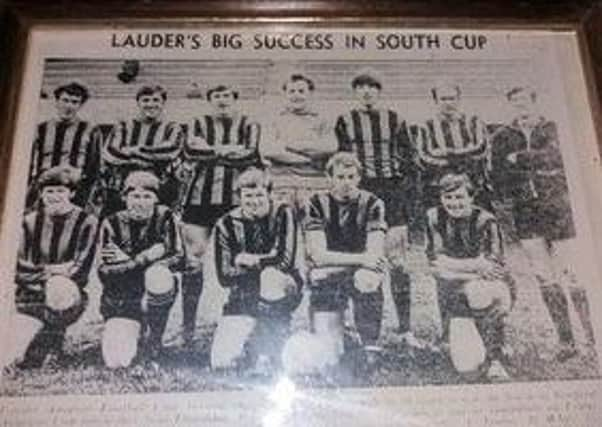Recalling Lauder’s finest moment 50 years ago in South of Scotland Cup


The town’s football team, at the time in the Border Amateur League, won the most sought-after piece of silverware in the region at the time, the South of Scotland Cup.
They defeated Tweeddale Rovers 2-1 in the final at Netherdale in Galashiels on Friday, May 15, 1970.
Advertisement
Hide AdAdvertisement
Hide AdThe surviving players and officials had hoped to enjoy the memories of that famous evening by staging a reunion celebration in the summer, which was to have been attended by guests from overseas.
Unfortunately, the coronavirus crisis has firmly ruled out any festivities, although the organisers hope to reschedule at a later date.
Until then, the abiding thoughts about Lauder’s triumph focus on the tremendous pride shared by the small town in a local victory, and the high quality of football played in the Borders leagues half a century ago.
George Threadgall, who played left back for Lauder that night, still feels privileged to have played locally at a time when the levels of skill and ability were so strong.
Advertisement
Hide AdAdvertisement
Hide Ad“Fifty years ago, the standard of football in the Borders and east of Scotland was very good – and I’m not looking at it through rose-tinted glasses,” he said.
“The Border League then was equivalent to the East of Scotland now.
“Tweeddale played in the Lothian Amateur League, which was a step up from our Border Amateur League.”
George, now 71, was from Duns and worked as a defence industry engineer before his job took him from Lauder to live in Linlithgow.
Advertisement
Hide AdAdvertisement
Hide AdHe recalled the build-up to the final which, for Lauder, was rather less than auspicious.
“ Our management team of Jim Brotherston and Alex McDonald went to watch Tweeddale play in a match a couple of weeks before we were due to play them in the final,” recalled George (71).
“The feedback to our team was along the lines of ‘the best we can hope for, lads, is to put on a good show and try our best’ – implying we had no chance whatsoever.
“Similarly, Tweeddale scouts had us watched the previous week and, as we all had a serious hangover from the night before, which was our Lauder Cornets Election night, we were well beaten 5-0 by one of the Hawick teams.”
Advertisement
Hide AdAdvertisement
Hide AdThis, said George, possibly planted the idea in Tweeddale’s minds that the final would be a formality.
But Lauder were a “competent and confident” side, said George, and their management had attributes which instilled good qualities in the team.
Jim Brotherston had been an ex-British professional mile champion, which meant Lauder’s standards of fitness were fairly high, while Alex McDonald had been on Hibernian’s books in his earlier days.
“We were currently lying third in the Border Amateur League and, of course, to get through to the final of the most prestigious cup in the Borders at the time was, in itself, a great achievement,” said George.
Advertisement
Hide AdAdvertisement
Hide Ad“Lauder has never again managed to win the cup and one or two of our team, who still live locally, take great delight in reminding anyone who will listen to their story,” he added.
“Sadly, two of the players – Dougie Johnston and Stan Seaton – and one of the management team, Alex McDonald, are no longer with us.
“Our team consisted mostly of local lads who had played together for years.
“Tweeddale Rovers hailed from Peebles and recruited players from all over the Borders. Along with Symington, they had a bit of a monopoly of winning said cup during that era.”
Advertisement
Hide AdAdvertisement
Hide AdIn fact, Tweeddale won the South of Scotland Cup six times – in 1966, 1967-68 and 1974-76 – while Symington lifted it in 1969 and 1971.
Tweeddale were also to have future full international connections, as the late Erich Schaedler played for them in the late 1960s before going on to play for Stirling Albion, Hibernian, Dundee, Dumbarton and Scotland.
In the 1970 final itself, Lauder went behind to an own goal from Kenny Rutherford, but then levelled and later went ahead with counters from Jimmy Gillie and Stan Seaton.
There was a nerve-shredding finish as Tweeddale were awarded a late penalty – but their player fired it over the bar.
Advertisement
Hide AdAdvertisement
Hide Ad“Lauder had a population of around 600 back then and half the town turned up to support us,” recollected George.
“We had a great celebration back in the Black Bull Hotel that night.”
George added: “One of our plaers, Dave Elrick, now lives in South Africa and he had planned to come home for a double celebration – the 50th anniversary of our famous victory and his golden jubilee as Lauder Cornet.
“There was talk of a reunion towards the end of July to coincide with Dave’s visit backhome but C19 has well and truly put paid to that.
Advertisement
Hide AdAdvertisement
Hide Ad“Fingers crossed, we will manage to rearrange once the world gets back to normal.
Lauder’s line-up that day was Adrian Gryczka, Alex Trotter, George Threadgall, Dougie Johnston, Kenny Rutherford, Dave White, Jimmy Gillie, Peter Hardy, Stan Seaton, Dave Elrick and Norman Turner, with substitute Billy Gilchrist.
George felt Lauder’s triuumph had interesting parallels with Celtic’s European Cup Final triumph in Lisbon three years earlier, although obviously, there was a huge gulf in the level of football.
A feeling of local spirit was the common factor, said George.
Advertisement
Hide AdAdvertisement
Hide Ad“Celtic won the first European Cup for Britain,” he said. “They were all from Glasgow – all local laddies.
“For us, it was a small town – many people were on our side and we were all pretty local. We were close-knit, so we thought ‘let’s fight it’.”